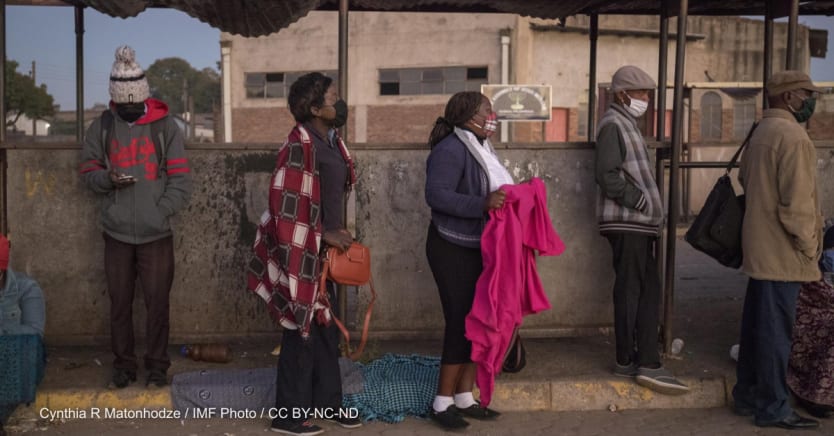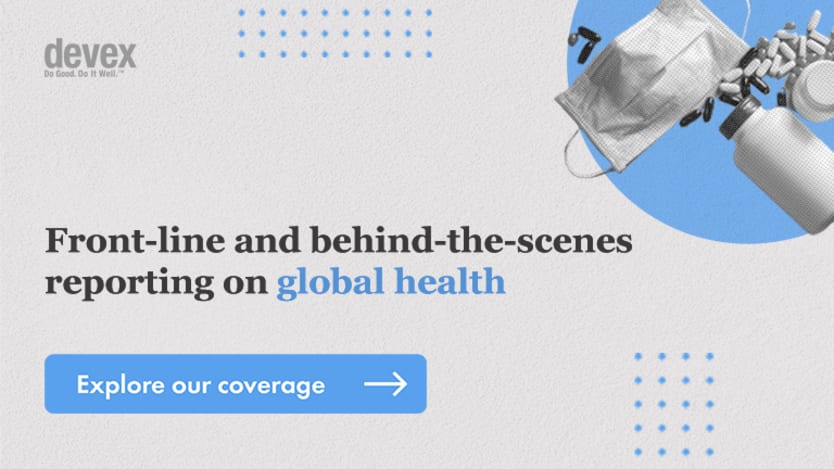
Experts from the World Health Organization cautioned against drawing any conclusions on how the new COVID-19 variant, omicron, might impact the trajectory of the pandemic, saying it’s still “very early days” in the data collection process.
Sign up for Devex CheckUp
The must-read weekly newsletter for exclusive global health news and insider insights.
While early evidence suggests the variant might cause less severe cases of COVID-19 — given that early data also shows it could be more transmissible than previous variants of the virus — the variant still has the potential to overwhelm health systems.
“Omicron is spreading at a rate we have not seen with any previous variant. We're concerned that people are dismissing omicron as mild. Surely, we have learned by now that we underestimate this virus at our peril. Even if omicron does cause less severe disease, the sheer number of cases could once again overwhelm unprepared health systems,” said WHO Director-General Dr. Tedros Adhanom Ghebreyesus during a briefing with journalists Tuesday.
He added the new variant has been reported in 77 countries, although it’s probably in most countries and has just not yet been detected.
Is it more transmissible? Is it more severe? And does it cause immune escape? These questions are top of mind with this new variant, said Dr. Salim Abdool Karim, a South Africa-based clinical infectious disease epidemiologist, during a panel discussion during the first international public health conference on the African continent Tuesday.
Throughout the course of the pandemic, there have been five variants of concern, which likely arose from immunosuppressed individuals — people that have maintained persistent infections for a long time, allowing the virus to mutate — or possibly from transmission across other hosts, such as animals, Karim said.
'Omicron is the smoke alarm that the world is on fire'
A number of access advocates and health experts have condemned vaccine inequity and high-income countries' lackluster response to the emergence of new variants such as omicron.
When the variant was first discovered several weeks ago, health experts were alarmed by the high levels of mutations it contained. Some of these mutations are also present in the alpha, beta, gamma, and delta variants — meaning there are clues to how the omicron variant will act.
This includes mutations associated with levels of immune escape, higher transmissibility and an improved ability to bind to cells. But there are also many mutations within the new variant that are unknown.
“We have no idea what they do, and we're going to learn about them now, as we see how this virus develops,” Karim said.
Data from Gauteng province in South Africa shows a steep increase in transmission compared to other waves of the pandemic in the country, Karim said. “At this point, if this is anything to go by, we can expect that it has increased transmissibility, the extent to which it is more transmissible than delta, remains to be measured. But at this point, it looks like it's more transmissible than delta,” Karim said.
But he cautioned against the hasty interpretation of this data, in that it is from the current wave, which is different from previous ones because the South African government has chosen to forego the implementation of the same levels of societal restrictions, meaning the virus has more opportunity to spread.
The African continent, as a whole, saw an 83% spike in new cases this past week, which is the fastest increase in COVID-19 cases this year, according to WHO. But there are fewer deaths than previous surges in cases.
On the question of severity, there are clues to be found in data from the Tshwane metropolitan area, which includes Pretoria — one of South Africa’s three capitals. In previous waves, about two-thirds of COVID-19 hospital admissions were severe cases. But in the first three weeks of November, only about one-fourth of cases have been severe.
Why South Africa keeps detecting COVID-19 variants like omicron
The discovery of the omicron variant in South Africa and Botswana has highlighted the genomic sequencing capabilities of South Africa — where scientists also discovered the beta variant in 2020.
“It's quite a marked difference. And it's not unique to any one particular age — it's across all the age groups, including those who are above 60,” he said. “In this particular wave, the proportion of patients who are severe is less and even in our age groups where there is much less vaccination — so you wouldn't see this largely as a vaccine effect.”
But even if that’s the case — a virus with high levels of transmission can overwhelm health systems.
“What has happened in the countries that have the variant is we've seen very rapid spread and very rapid transmission and a very large number of cases being generated,” said Dr. Mike Ryan, executive director of the emergencies program at WHO. “When you have a large number of cases, even if that disease … is slightly milder in each individual, if you have a huge wave of cases, you will see a lot of severity and you will see hospital systems coming under pressure.”
There are also indications of high levels of re-infection with omicron — which could suggest that past natural infections from other COVID-19 variants provide little, if any, protection against new infection with omicron. Researchers in South Africa have documented high levels of re-infection among people who have fallen ill from the omicron variant compared to past waves, Karim said. The research found that reinfection is 2.4 times more common during this wave than previous waves.
Early research also suggests omicron might lower vaccines’ efficacy in protecting against mild, symptomatic cases of COVID-19, which could mean more mild infections from omicron, but there is likely to be less of an impact on severe cases, Karim said.
“We're concerned that people are dismissing omicron as mild. Surely, we have learned by now that we underestimate this virus at our peril.”
— Dr. Tedros Adhanom Ghebreyesus, director-general, WHOExperts say avoiding infection is not the key goal for these vaccines anyway.
“The primary target of these products, of vaccines, is to prevent severe illness, hospitalization, and death,” Ryan said.
“The question is, how much protection are the current vaccines that we are using, which are currently life-saving against all the variants. To what extent do we lose any protection against severe illness and death against omicron? The data is pointing towards there being significant protection.”
“The data on omicron and the performance of vaccines is in very early days,” Dr. Kate O'Brien, director at WHO's Department of Immunization, Vaccines and Biologicals, added.
WHO experts emphasized that countries need to continue with the tried and tested public health interventions used during this pandemic — such as mask wearing and limiting social gatherings — to curb the transmission of this variant, and to prepare health systems for an influx of cases, as the holiday season approaches and people gather.
“Look at your health systems in the coming weeks. Make sure you have the health workers in place. Make sure you have the clinical triage in place. Make sure you've got oxygen supplies in place. Make sure that you're vaccinating the unvaccinated. Make sure you're taking every opportunity individually and at a community level to stop transmission where you can,” Ryan said.
“We've got a number of weeks now before the peak of this wave will probably hit. You can't do everything, so given choices in the system, what are your best options? What's the best choice to make with the resources you have?” he asked. “Vaccinate the unvaccinated, vulnerable people. That's a great choice. Try and suppress transmission. Try and prevent infection spreading at the rate it's spreading, prepare your health system.”









